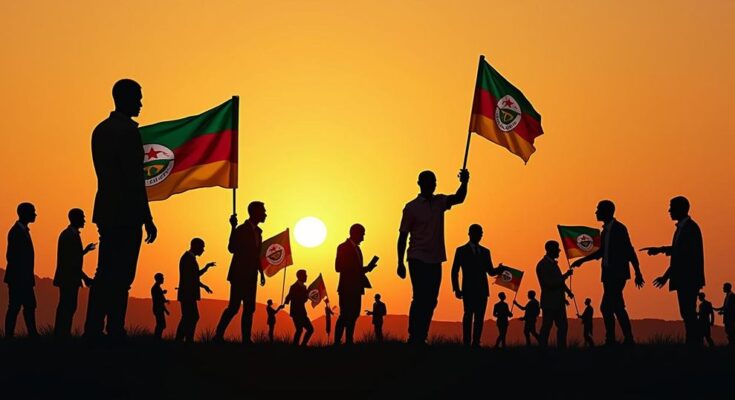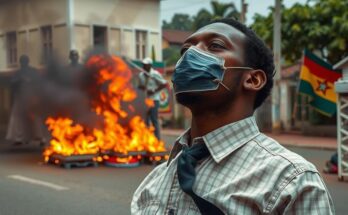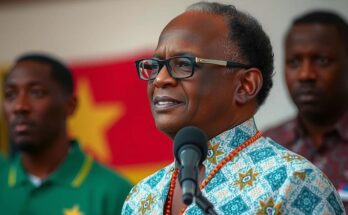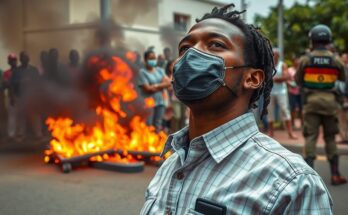Mozambique’s ruling party, Frelimo, led by presidential candidate Daniel Chapo, is poised to continue its nearly 50-year dominance as the opposition remains largely fractured and uninspiring. The election is set for October 9, with candidates facing challenges in their campaigns, particularly Ossufo Momade and Lutero Simango who struggle with public engagement and internal strife within their parties.
In Mozambique, vibrant red banners have transformed the cities, marking the campaign of the Frelimo party, which has governed since the country’s independence nearly five decades ago. As the election campaign commenced on August 24, the ruling party’s color has dominated public spaces. With President Filipe Nyusi unable to run for a third term after a decade in office, Frelimo has introduced Daniel Chapo, the current governor of Inhambane province, as its new candidate. Chapo’s campaign is highly visible, with his image appearing prominently on billboards and posters throughout the nation, mirroring the extensive visibility of Frelimo’s branding. Opposition parties face significant challenges; there are 36 registered parties competing for the 250 parliamentary seats, yet their presence is virtually dwarfed by Frelimo’s campaign. Few posters adorn public spaces for the opposing candidates, making it difficult for voters to understand the alternatives to Frelimo. Notable competitors include Ossufo Momade from the largest opposition party, Renamo, and Lutero Simango of the Democratic Movement of Mozambique (MDM). Despite being perceived as promising and bolstered by support from smaller parties, Momade’s campaign has lacked vigor and enthusiasm. Internal dissent within Renamo indicates a broader challenge, with some members distancing themselves from his leadership following the passing of the previous leader, Afonso Dhlakama. Simango has focused on advocating for political reforms, critiquing the dominance of Frelimo at all governmental levels. He has argued that the nation’s progress is hindered by the lack of independence of state institutions. Meanwhile, Venancio Mondlane has emerged as a more controversial figure, previously associated with Renamo but now leading his own party after resigning from parliament. His exclusion from the parliamentary elections by the National Election Commission has sparked claims of unfair treatment, though young voters in urban areas have shown support for him as a potential change agent. The National Election Commission (CNE) appears to be prepared to oversee the elections set for October 9, notwithstanding prior issues concerning the timely release of campaign funds for smaller parties. With over 17 million registered voters, including nearly 334,000 abroad, anticipation runs high that Daniel Chapo will succeed as the next president of Mozambique, continuing Frelimo’s longstanding rule.
The political landscape of Mozambique has been dominated by the Frelimo party since the nation obtained independence in 1975. With the upcoming elections scheduled for October 9, the ruling party, having held power for nearly half a century, is viewed as the clear frontrunner. The recent shift in leadership within Frelimo, prompted by President Filipe Nyusi’s term limits, marks a significant change as the party introduces Daniel Chapo as its next presidential candidate. Meanwhile, the fractured opposition, comprising numerous political entities, is struggling to present a compelling alternative to voters, with various leaders demonstrating weak campaigning efforts.
The upcoming elections in Mozambique are shaping up to reinforce the ruling Frelimo party’s dominance, with its candidate Daniel Chapo showing overwhelming visibility in his campaign. The fragmented opposition faces considerable hurdles, with internal dissension and lack of public engagement posing significant challenges to their electoral prospects. As election day approaches, the expectations remain high for Frelimo to maintain its longstanding position of power, despite the burgeoning hope among some voters for alternative leadership.
Original Source: www.dw.com




